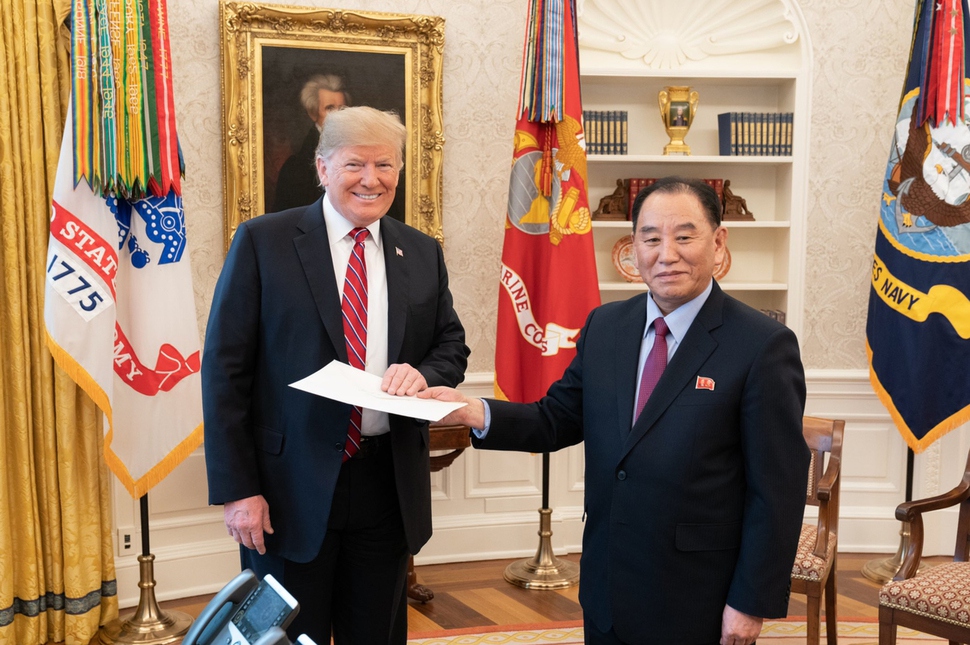 |
|
US President Donald Trump receives a letter from North Korean leader Kim Jong-un via WPK Vice Chairman Kim Yong-chol at the White House on Jan. 19. (Dan Scavino’s Twitter account)
|
Public livelihood and Mt. Kumgang tourism most probable areas
On Jan. 19, US President Donald Trump told reporters at the White House that the US and the North Korea were discussing many things in addition to denuclearization. This means that the topic of additional steps toward denuclearization by North Korea and corresponding measures by the US came up during Trump’s meeting the previous day with Kim Yong-chol, vice chairman of the Workers’ Party of Korea (WPK). At the heart of the corresponding measures proposed by North Korea are relaxing UN sanctions. It hasn’t been confirmed how much the issue of sanctions was discussed during this meeting. During a briefing after Trump and Kim’s meeting on Jan. 18, White House Press Secretary Sarah Sanders even emphasized the continuation of pressure and sanctions on North Korea. Sources say that the US remains unfavorable to easing sanctions. Nevertheless, it’s widely thought that “the issue of easing sanctions is a key agenda point that will determine the success or failure of the second North Korea-US summit” (according to a South Korean senior official in diplomacy and security) and is “ultimately the issue that will be tackled during the Kim-Trump meeting” (according to a former high-ranking South Korean official). There are two ways to relax sanctions. The first would be the direct approach of adopting another UN resolution that would lift sanctions that affect public livelihood. For example, North Korea could be allowed to resume exports of marine products, agricultural products, textiles and coal. Sanctions by the UN Security Council have gradually been extended into the area of public livelihood, first banning exports of coal except for those pertaining to livelihood (Resolution No. 2270, Mar. 2, 2016), next banning exports of marine products and coal (Resolution No. 2371, Aug. 5, 2017), banning exports of textile products (Resolution No. 2375, Sept. 11, 2017) and finally banning exports of agricultural products (Resolution No. 2397, Dec. 22, 2017). To ease sanctions, all the UN needs do is adopt resolutions that would reverse those bans, but many analysts believe that this isn’t realistic for now given the domestic political situation in the US. Best option could be providing special extensions based on existing UN resolutions The second option would be easing sanctions through interpretation of the relevant laws. Resolution No. 2397, the final sanctions resolution adopted by the UN, allows the option of providing specific exemptions to the sanctions (Article 25) while welcoming and emphasizing efforts to maintain peace and stability on the Korean Peninsula and in Northeast Asia, to resolve conflict through dialogue and to ease tensions. And even the US legislation that toughened sanctions against North Korea states that exemptions can be made from the sanctions in order to promote the peaceful and democratic unification of the Korean Peninsula. This means that the Kaesong Industrial Complex and other large-scale inter-Korean economic cooperation projects could be exempted from the sanctions right now, without even altering the UN and US’ current sanctions regime, provided the requisite political resolve and momentum. “Rather than easing sanctions by adopting UN resolutions, it would be more practical to grant specific exemptions to inter-Korean economic cooperation projects by citing the existing regulations,” said Kim Gwang-gil, an attorney with the law firm Jipyong who is an expert on the North Korean sanctions issue. South Korean President Moon Jae-in and North Korean leader Kim Jong-un have emphasized their commitment to resuming tourism to Mt. Kumgang and operations at the Kaesong Industrial Complex during their Pyongyang Declaration last September and in Kim’s New Year’s address and Moon’s New Year’s press conference. And since tourism to Mt. Kumgang is not technically even subject to UN and US sanctions, it would be possible to resume tourism there given a political push to do so. By Lee Je-hun, senior staff writer Please direct comments or questions to [english@hani.co.kr]






